Called to the periphery
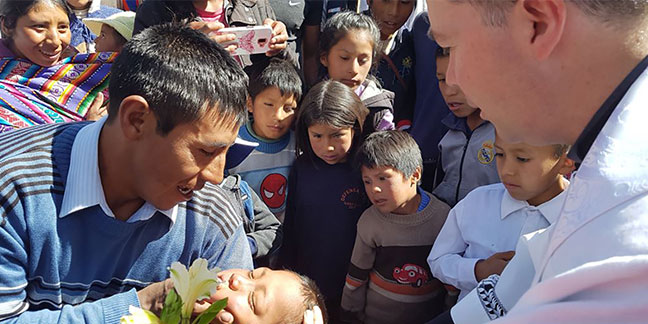 GREENSBORO — Few missionary priests have visited the Diocese of Charlotte over the past year, as travel has been restricted during the COVID-19 pandemic.
GREENSBORO — Few missionary priests have visited the Diocese of Charlotte over the past year, as travel has been restricted during the COVID-19 pandemic.
So it was a special treat for Our Lady of Grace Parish to recently welcome back Father Andrés Gutiérrez, a missionary priest from Peru and the son of parishioners Fernando and Martha Gutiérrez.
Father Gutiérrez visited the parish last month to see his family and share updates about his work as a missionary priest in Cusco, Peru. It had been a year and a half since he had been able to travel from Cusco, which has been hit hard by the pandemic.
Missionary work more critical than ever
Father Gutiérrez serves as pastor of St. Martin de Porres Parish in Cusco. Located in the Andes at an elevation of 11,000 feet, his parish has about 40,000 people who live in the city or scattered among 10 rural mountain communities.
The area has become less isolated over the past few decades, but people still live simply and many are poor. Father Gutiérrez and two other priests travel regularly to the mountain villages to offer Mass and care for people’s spiritual needs. Personal connection is essential, he says, because the communities are so isolated.
“The archbishop wants the priests to go where the people are because there are difficulties in having the people come to the parish,” he says. “We have parish life and the parish Masses and everything, but then we try to go to where the people live so that they don’t have an excuse to leave their faith. We take turns in the communities with religious education, catechesis, sacraments, Mass.”
Pastoral agents, comprised of missionary families and local residents, help the priests with faith formation classes and other needs.
Those needs have grown over the past year, as the COVID-19 pandemic has spread. More than 45,000 Peruvians have died of COVID-19 – one of the world’s highest per-capita death tolls – and the number of deaths keeps rising. Tourism, a staple of the economy, has evaporated and people are hurting financially.
In Cusco, a soup kitchen was started at St. Martin de Porres Parish that, during the early days of the pandemic, served 200-300 meals a day. The parish has also been collecting donations of fruits and vegetables from the city markets to pass out to people in need.
“On Sundays, I would go to the rural mountain communities with a pick-up full of these fruits and vegetables, and we would also buy sacks of rice, pasta, sugar, oil – just basics – and we would bring that and share it with the families, all of them very poor, so that each family could take a grocery bag to their homes,” Father Gutiérrez says. “It’s a huge outreach effort and thank God I have a good team of support. We have been able to give witness to the nearness and maternal concern the Church has for her children.”
The Cusco parish is not alone in how the pandemic has made life worse for people already living on the margins.
There has been “incalculable devastation” among other mission communities, reports Father Patrick Cahill, diocesan director for the Society for the Propagation of the Faith, the Church’s world missions program.
“The entire world is struggling with this new reality,” Father Cahill says. Not only is the spiritual work of the Church – providing the sacraments, visiting the sick, burying the dead – more critical than ever, but visits from missionary priests and collections to support their work are way down.
Normally, 40 missionary priests from all over the world visit 50 or 60 North Carolina parishes to make appeals each summer, but last summer’s visits were all postponed until this summer.
In addition, second collections for World Mission Sunday and the Missionary Cooperative Appeal have seen declines over the past year.
“We typically distribute over $600,000 from our diocese to the mission Church,” Father Cahill says, “but last year the number was way less than half of that.”
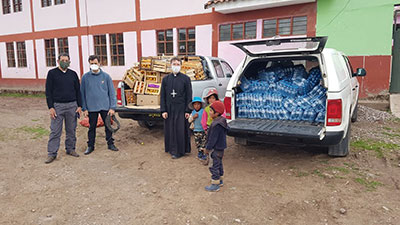 Father Gutiérrez is pictured with some of the pastoral agents who assist in caring for the 40,000 people living in his parish. Yet Father Cahill applauds the people of the diocese for their long-standing support to people in need around the world, including Peru, Egypt, Haiti and 45 other countries.
Father Gutiérrez is pictured with some of the pastoral agents who assist in caring for the 40,000 people living in his parish. Yet Father Cahill applauds the people of the diocese for their long-standing support to people in need around the world, including Peru, Egypt, Haiti and 45 other countries.
“I’m so appreciative of the way the parishes have welcomed the missionaries making appeals,” he says. “Pope Francis has emphasized that wealthy countries can learn a lot from the mission Church in the developing world. As diocesan director, I thank the pastors and the people for opening themselves to this essential dimension of our Church. Jesus clearly commands us to go to the ends of the earth with His message of reconciliation and peace.”
And these efforts have had profound impacts, Father Cahill says.
“The projects that I have been able to see firsthand literally transform a Christian community. On a visit to see how our funds were being used, I visited a poor village in southern India,” he says. “The people said to me: The funds sent are like God’s grace that have built this parish and school. Seeing you here and touching your hand and having you enjoy our food at the dedication is an incarnation.”
Father Gutiérrez is among those missionary priests who visit parishes in the Charlotte diocese each summer as part of the diocese’s world missions appeal, and local parishes have been integral in supporting his work in Cusco.
“Through those donations, I have been able to carry out many important projects in favor of the poor and the parish,” he says, particularly with remodeling the church and replacing its aging roof.
A missionary calling
How does someone discern a calling as a missionary? For Father Gutiérrez, the call to the priesthood came first.
Seeds of a vocation were planted when he was in college at the University of Florida. His faith life had always been quiet and deep, but a three-week mission trip to Cusco when he was a college sophomore left an indelible mark.
“To see firsthand the type of poverty you would never see here in the States, and to realize that those suffering that poverty are your brothers and sisters in Christ … I couldn’t remain indifferent,” he recalls.
Discernment “was a slow process that developed with time,” he says. After college, he started seeking answers to life’s fundamental questions.
“I was at that time in life when you have to choose a direction. I had finished college with a master’s degree in materials science and engineering, I was working in R&D for Intel Corp. in Arizona, making a very good salary. I had a good, very Catholic girlfriend. It was time to ask the tough questions: Am I going to form a family? Is that what God wants from me? Is all my energy and intellectual potential going to go into making faster Pentium computer chips? Could my capacities and my talents be used for a greater good? Where could I do the most good?
“That’s what inspired me to give it a good try, and it worked out.”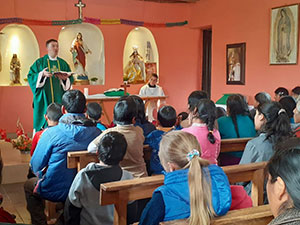 He offers Mass in one of the rural village chapels.
He offers Mass in one of the rural village chapels.
He studied for the priesthood at a seminary in Spain with a group of missionary priests and finished his theology courses in Rome before being ordained for the Archdiocese of Cusco in 2015.
There could be many more people called to missionary work, Father Gutiérrez believes, if they only allow themselves to experience this powerful aspect of sharing the Gospel.
“You can’t love what you don’t know,” he says. “When you think about taking a vacation or traveling, it’s usually not one of the ideas to go have a missionary experience, but that’s something that could help people not only in Cusco but all over the world.”
Mindful of his own life-changing encounter, Father Gutiérrez has welcomed to his Cusco parish other young people who are seeking to know God’s will in their life. He encourages them to be open and curious about the possibilities.
“I take them out to the communities, and I just carry out my ministry, and they’re like, ‘Wow this is amazing. I never thought of it.’ It opens up that possibility of this, ‘I need to have this component in my life’ realization.”
Missionary life is challenging, but the sacrifices are worth it, Father Gutiérrez says.
“There’s no romanticizing a missionary vocation, but there is an immense joy in seeing and witnessing lives being affected, knowing that God is working through that.”
Gratitude for Mary’s intercession
His parents Fernando and Martha Gutiérrez are grateful to God for their son’s vocation.
“We’re really happy to have him as a priest, first of all,” says Fernando, “and then his missionary vocation is something that we cannot give enough thanks to God because we know he prays for us all the time, and we can be present in the missions in a certain way by helping him and supporting him.”
Years ago when they were living in Florida, the Gutiérrezes consecrated their family and their three sons to Jesus through the Blessed Virgin Mary.
Through her protection, intercession and perfect example of holiness, God’s will was made clearer to them, they say.
Now daily Mass goers at Our Lady of Grace, they support their sons’ vocations spiritually through praying the rosary and St. Pio of Pietrelcina’s
Efficacious Novena to the Sacred Heart. The couple have also helped their priest-son’s mission financially by setting up The Mary of the Encounter Foundation in Greensboro, where donors can make tax-deductible gifts. Their dedication, together with a small group of volunteers, has helped poor families in manifold ways in Peru.
“When you’re called to be a missionary priest, there’s an added layer of identity for the priest,” says Martha Gutiérrez. “Missionary work is so different than if you’re able to work in your own city or country. You go so far to do something completely different in an unfamiliar culture.”
Father Gutiérrez credits Mary with his missionary vocation and the fruits it has produced, and he encourages others to put their trust in Jesus through Mary.
“I think about Our Blessed Mother and how she has directed everything, even when we were children, my parents, my family through our daily rosary. It is hugely important for families to realize that if we trust her, she’s going to direct us. She’s going to guide us, she’s going to protect us, and she’s going to bring us to her Son – to where we should be, to doing what we should be doing.”
— Annie Ferguson, Correspondent
Pictured: Father Andrés Gutiérrez, whose parents attend Our Lady of Grace Parish in Greensboro, is a missionary priest in Cusco, Peru. Here he is pictured baptizing a small child. (Photos provided)
‘It’s a God thing’
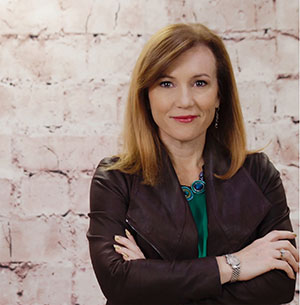 CHARLOTTE — Theresa Payton, a longtime parishioner of St. Peter Church, is an author and national media expert on cybersecurity. In her latest book, “Manipulated: Inside the Cyberwar to Hijack Elections and Distort the Truth,” Payton breaks down misinformation campaigns and empowers people to understand how they are being manipulated online.
CHARLOTTE — Theresa Payton, a longtime parishioner of St. Peter Church, is an author and national media expert on cybersecurity. In her latest book, “Manipulated: Inside the Cyberwar to Hijack Elections and Distort the Truth,” Payton breaks down misinformation campaigns and empowers people to understand how they are being manipulated online.
This is Payton’s third book, and although she wrote it in the aftermath of the contentious 2016 election, the lessons she imparts are even more relevant today.
Her inspiration came from her work through the technology company she founded, Fortalice Solutions.
“We do work on behalf of the U.S. government and our allies, as well as private-sector companies and individuals. In the 2015-’16 timeframe, I was observing more companies and individuals experiencing different digital events that were impacting their brand and their psyche, how they consumed facts versus fiction and how they consumed information,” she explains.
“Across the board, I saw misinformation and manipulation campaigns amping up – not even just about politics. I was seeing unscrupulous business competitors saying something terrible about a company or an industry, trying to put them out of business. I was tracking those misinformation campaigns, advising individuals and businesses… And in the 2016 elections and the months that followed, we learned about the misinformation campaigns conducted by Russia.”
But “Manipulated” is not just a story about election interference, she says. “It’s more of a global book centered around all social issues – everything from fracking versus no fracking, vaccinations versus no vaccinations – it’s all of the social issues in which people normally have different feelings on a spectrum, then find some common ground and push ahead.”
Payton has a long and illustrious career in cybersecurity – including serving as chief information officer for President George W. Bush, the first woman in this key national security role.
Her career is more of a calling and she leans heavily on her Catholic faith, she says. “I truly believe it’s a God thing, that I have been led to do this kind of work.”
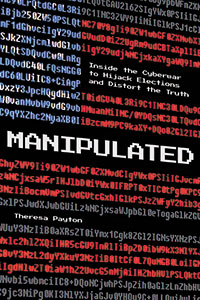 As she was leaving her position at the White House, she asked God where He was calling her to focus her skills. “I really got this strong message that it was fighting cybercrime – taking my faith and my training over the years at work to help people understand the dangers of the digital age.”
As she was leaving her position at the White House, she asked God where He was calling her to focus her skills. “I really got this strong message that it was fighting cybercrime – taking my faith and my training over the years at work to help people understand the dangers of the digital age.”
Now during the pandemic, when people are physically distant but virtually connected, Payton is focused even more intensely on protecting and educating people.
“Unfortunately, while we are looking for a deeper attachment to each other and it is necessarily through digital means, it can take us off our path,” she says. “Focusing on protecting people as they live and work in the digital realm is where I feel uniquely called and led to help people.”
Manipulators of information have a limitless supply of opportunities but similar motivations, she points out – including controlling people and conversations, inciting people to argue with each other instead of seeking common ground, and making money off people using “click-bait” headlines.
“The other reason why I wrote the book is that government, big tech and social media companies can’t move fast enough to protect us,” Payton explains. “Superman is not coming to save us.”
Payton has fictional vignettes in the book to illustrate what can happen if we don’t take personal responsibility for our online behavior. She also shares telltale signs to help people understand how they are being manipulated, how to fact check information, and how to have a conversation with others and point them to reliable resources.
“We have to educate the whole community,” she says.
Her work is monumental and never-ending, so Payton makes sure to pray every morning. “I say to God, ‘This your mission, let me be Your hands and feet today.’ And I ask Him, ‘Where can I shine Your light today in what can be this dark world?”
— SueAnn Howell, Senior reporter
Learn more
“Manipulated: Inside the Cyberwar to Hijack Elections and Distort the Truth” by Theresa Payton is available online at www.amazon.com and www.walmart.com.
Follow Payton on Twitter @trackerpayton or check out Fortalice Solutions on Facebook, Twitter and Instagram.

